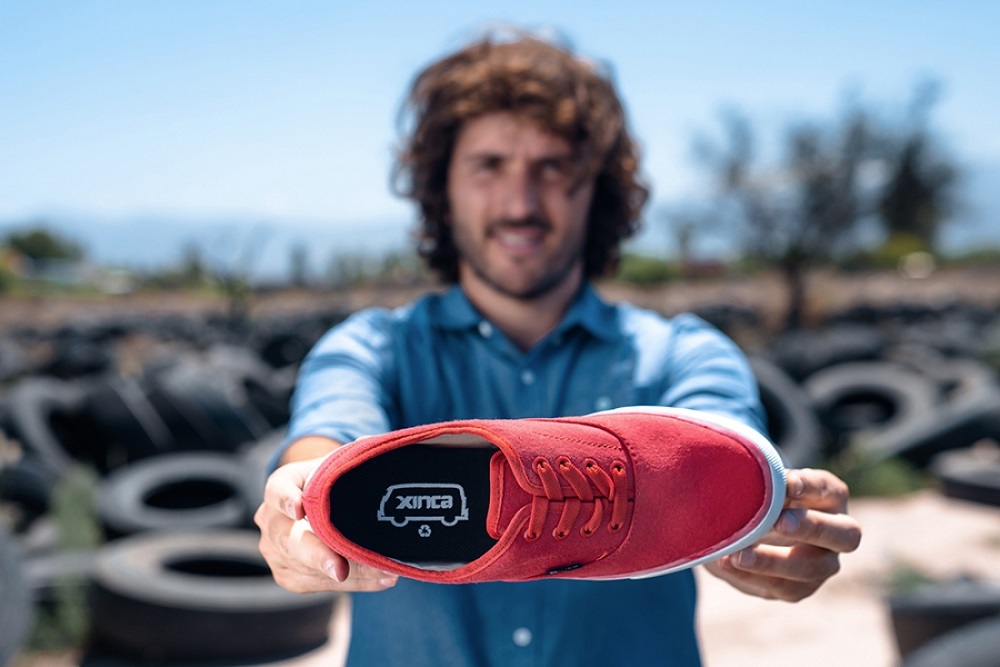Xinca shoes are made in Argentina from end of life tyres in craft workshops.
According to Argentina’s INTI, reported in El Pais, the country has 15 million motor vehicles and they generate around 130 – 150,000 tons of waste each year.
Despite existing bills about environmental responsibility, producers are not required by the government to recycle the material. In most cases, recycling initiatives and effective solutions continue to come from civil society organisations and private companies.
“Our shoes are trash,” says the advertisement for Xinca, a company in the province of Mendoza, which three friends created in 2013. The business produces footwear made from recycled tyres.
“In Argentina, a lot is discarded and little is recycled. After their primary use, there is no telling what we should do with the tires. In Africa, they usually make sandals by cutting the tire directly, but the aesthetic was bad. We wanted to break with that paradigm by demonstrating that a quality product can be made with garbage,” said Alejandro Margor, co-founder of the company with Nazareno El Hom and Ezequiel Gatti.
Xinca works with a recycling plant that receives tyres.
“Only between 5 and 7 per cent of the tyres are recycled. But we know that making the shoes is only part of the job. If you can’t sell it, the intention to recycle is useless. That’s why we design simple, timeless, unisex pairs. We also wanted to break with another paradigm: that of expensive sustainable products,” added Margor.
A pair of shoes from an international brand costs 20,000 pesos (about $92) in the country. Meanwhile, the cheapest model of the “eco shoes” — as Xinca calls them — sell for only 6,000 ($28).
The company produces between 1,000 and 1,500 pairs of shoes per month. They are sold in Argentina via a dozen stores in different cities and the company’s website. “In Argentina, the rules change all the time, and it is difficult to see into the future. In other countries, the ecosystem is easier, as is access to investment. Another difficulty is reaching consumers who are encouraged to choose products that are made with waste.,” Margor said.
The company also has a social impact in its region: 90% of the production is carried out in workshops of the San Felipe Mendoza prison. “We wanted to work with people who have not had the luck or the opportunities that we had access to. Beyond giving them a job, we saw the possibility of helping to build habits.We pay them for their work the same — or perhaps a little more — than what is established for shoe workers in Argentina,” he said.
The company’s efforts and other initiatives are valuable but are still insufficient to address the quantity of tyre waste. The local organisation Fundación Ambiente y Medio warns that most tyres end up in open or in collected dumps, which encourages the proliferation of rodents and dengue-vector mosquitoes. They are also often burned for disposal, which generates toxic gases that contain sulphur, carbon dioxide, chlorinated compounds and other chemicals that can harm human health and the environment.
“It is imperative to develop and approve an extended producer responsibility law, in order to hold accountable those who make the products. In this case, the tyre industry should have to bear the cost of logistics and delivery to the treatment plants that exist today in the country,” said Luciana Dorigo, executive director of the foundation.
90 per cent of tyre material is recyclable, but institution emphasises that the percentage of reuse in Argentina is very low. “We know that the main tyre recycling plant in the country only manages to work with 10% of the 150,000 tons of tyres discarded annually,” Dorigo added.


















